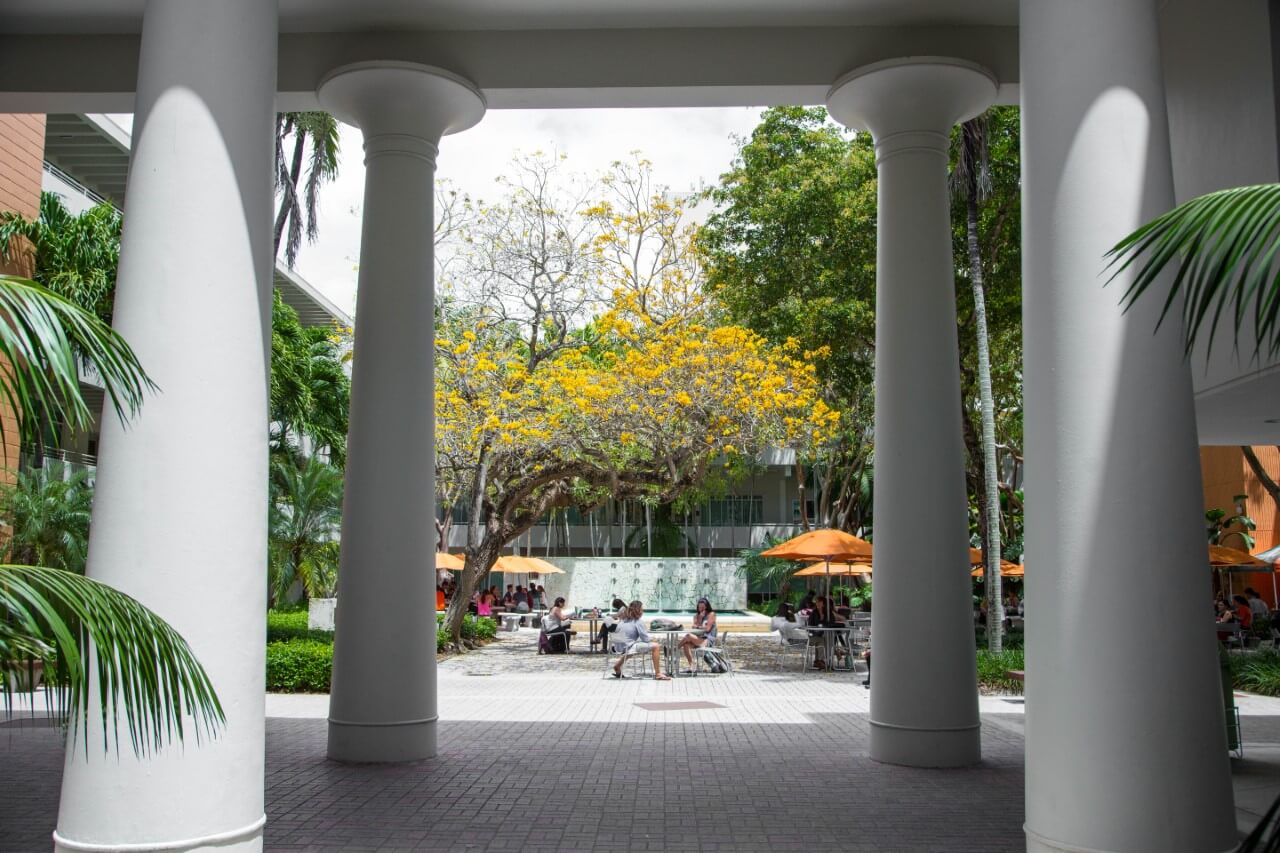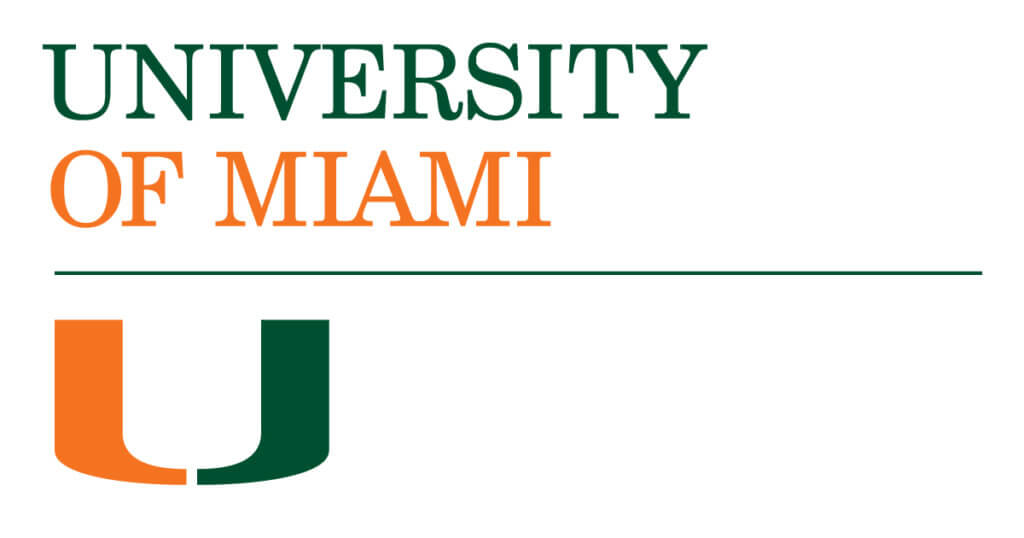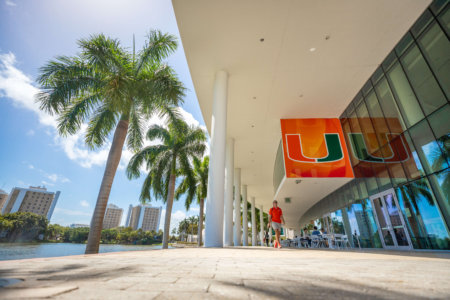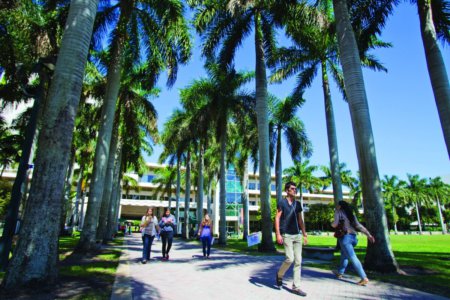It’s been described as a city of “dizzying multiculturalism” — permeating everything from the food to the architecture — and where live salsa is followed by house music in a legendary nightlife scene. Every year, it welcomes a steady stream of visitors from all over the world. Enamored, many settle here, forming micro-communities, from Little Venezuela to Little Jamaica and Little Moscow. Listen and accents of all sorts are the norm here; look and people of all color comprise the make-up of its central business district.
This cosmopolitan city is the sun-dappled backdrop of the University of Miami’s School of Law. Lorena Senra from Galicia, Spain describes the city’s impressive diversity as the highlight of her time pursuing an Intensive Legal English + LL.M. Program at Miami Law.
“Academically, the program helped me to become more proficient in English and improve my legal vocabulary. It also taught me specific skills necessary for law school, such as debating and the American style of writing,” says Senra. “But the best part of the Intensive Legal English Program is meeting people from different countries.”
In one semester, Senra and her classmates improved their English language proficiency and communication skills before they progressed into an LL.M. program. In small classes, they have the dedicated attention of faculty members, carefully reviewing each of their work and assignments. All students are fully integrated into the law school community, including its academic networking and social events. There is even an Introduction to U.S. Law Course, specifically designed for international students who completed their legal education outside of the U.S., to provide an overview of the U.S. legal system.
It was the ideal pathway for Senra before jumping into a full-blown LL.M. in a foreign country. Senra has since completed her J.D. degree (at Miami Law as well) and sat for the Florida Bar Exam this year. “I want a high-quality education before I start working,” says Senra. “My plans are to stay in the U.S. and pursue a career as a lawyer because this country has opportunities that I will not find anywhere else.”
Miami Law offers a variety of graduate programs to help U.S. and foreign-trained law students and lawyers raise their practice to new heights and deepen their specialization. These include the LL.M. in US and Transnational Law for Foreign-Trained Lawyers and specialized LL.M. programs in Entertainment, Arts and Sports Law, International Arbitration, Maritime Law, Real Estate/Property Development, Tax Law or Taxation of Cross-Border Investment.
Many of Miami Law’s LL.M. students progress into a Juris Doctor degree. This full-time program, that foreign-trained students can complete in as little as two and a half years, combines academics with professional training in critical lawyering skills — a rigorous journey supported significantly by the people they are surrounded by. Advisors are always available, guiding students on how to transfer to the J.D. program and what to study to prepare to take a U.S. Bar Exam. This was the experience of Indira Agrenot who studied intensive English, then an LL.M. and then the J.D.
Every year, Miami Law welcomes over 50 foreign-trained lawyers into its LL.M. and J.D. programs. They stand to follow in the steps of graduates who go on to become luminaries in the legal field and beyond, such as head of global affairs and chief legal counsel for music behemoth Spotify Horacio Gutiérrez, Vice President of the Federal Constitutional Court of Germany Doris König, city attorney for Coral Gables Miriam Soler Ramos and global CEO of Hogan Lovells Miguel A. Zaldivar, Jr.
Success is in the DNA of Miami Law graduates. Their impetus? Preeminent faculty and visiting professors whose expertise cuts across all areas law and whose support for students are selfless.
Andrea Ewart, J.D.’00 from Jamaica, is now the founder of an international trade practice DevelopTradeLaw, LLC in Washington, D.C., delivering custom-tailored legal and business solutions to companies doing business internationally. She credits her expertise today to the excellent legal training and accessible faculty at Miami Law. “Professor David Abraham got me started on the writing path when he and his secretary held my hand through the process of refining and successfully submitting for journal publication a paper I had written for his class,” Ewart explains. “A practicum with Professor Elizabeth Iglesias helped me to see how law could be used as a tool for social change.”
Recently, Miami Law International Arbitration LL.M. graduate Harisankar Mahapatra was awarded an Honourable Mention in the prestigious Nappert Prize in International Arbitration. He remembers “interacting with professors and students from different cultural and national backgrounds” during his LL.M. and practical courses in Forensics of Advocacy in International Arbitration taught by Daniel E. González, partner and global head of international arbitration practice at Hogan Lovells, and Luke Sobota, founding partner at Three Crowns. This was where he learned how to “make oral and written submissions based on real-life disputes,” which helped him “to learn and nurture different skills pertaining to the handling of arbitration disputes.”
The law school is committed to provide more flexibility to international students in the U.S. interested in its graduate LL.M. programs. If necessary, students can even start online in Spring 2021 and move into an in-person program next fall. Whichever route they take, students are set for an energetic, tech-savvy and dynamic graduate education at Miami Law.
To learn more about why international students join Miami Law, click here.
Like this? Then you’ll love…
How to become a transnational lawyer at the University of Miami School of Law
Online, innovative and experiential: Miami Law’s LL.M. in Real Estate Development













